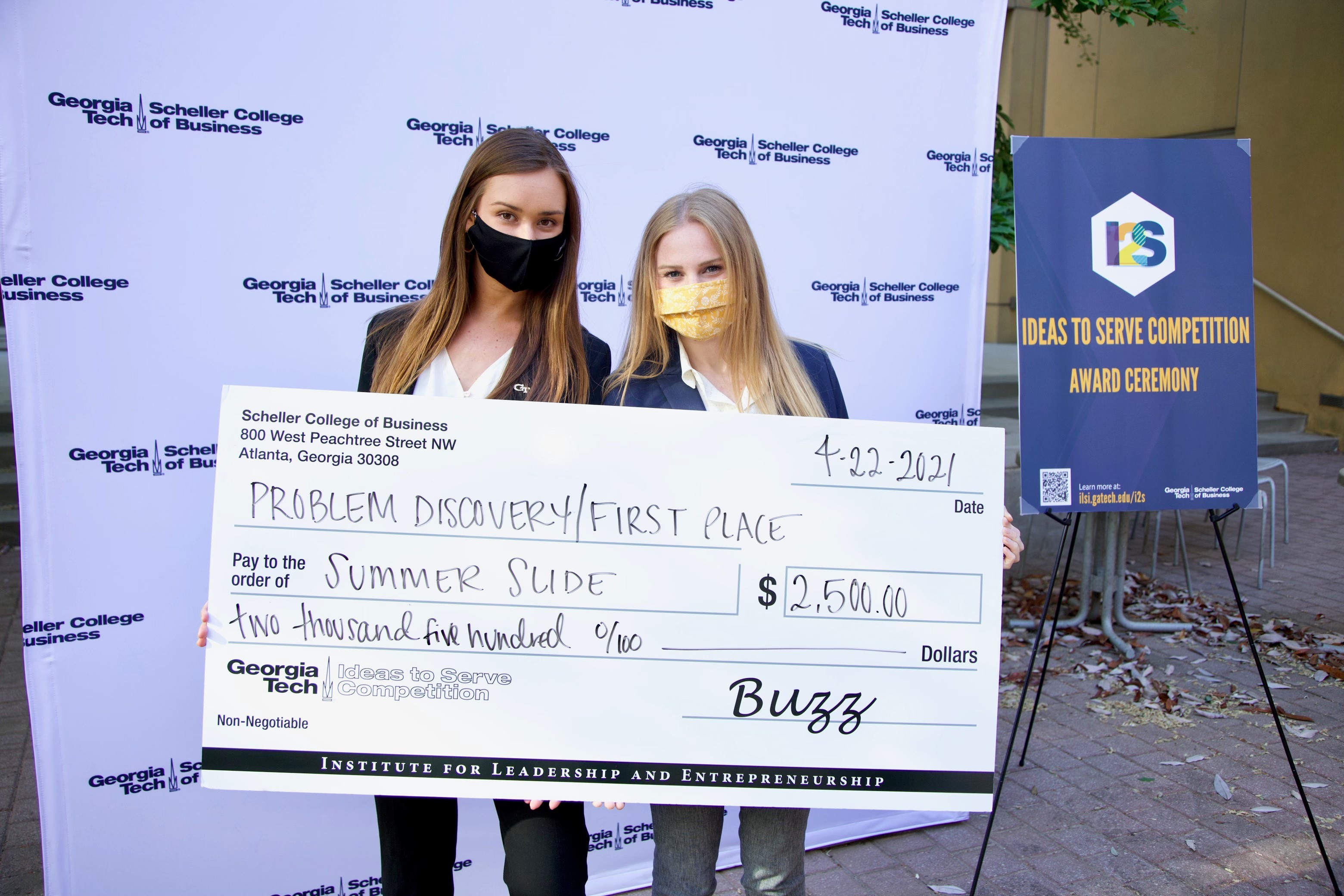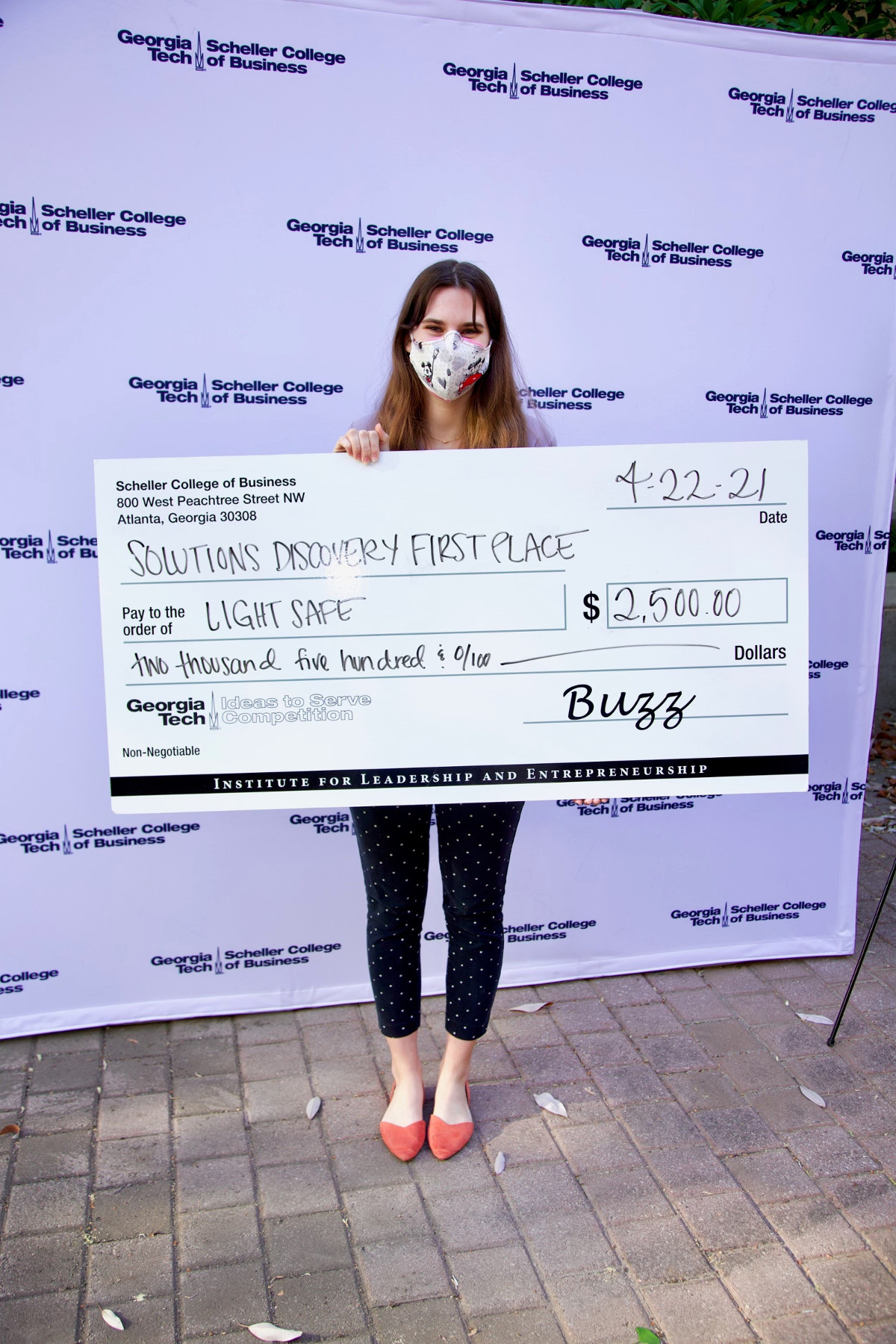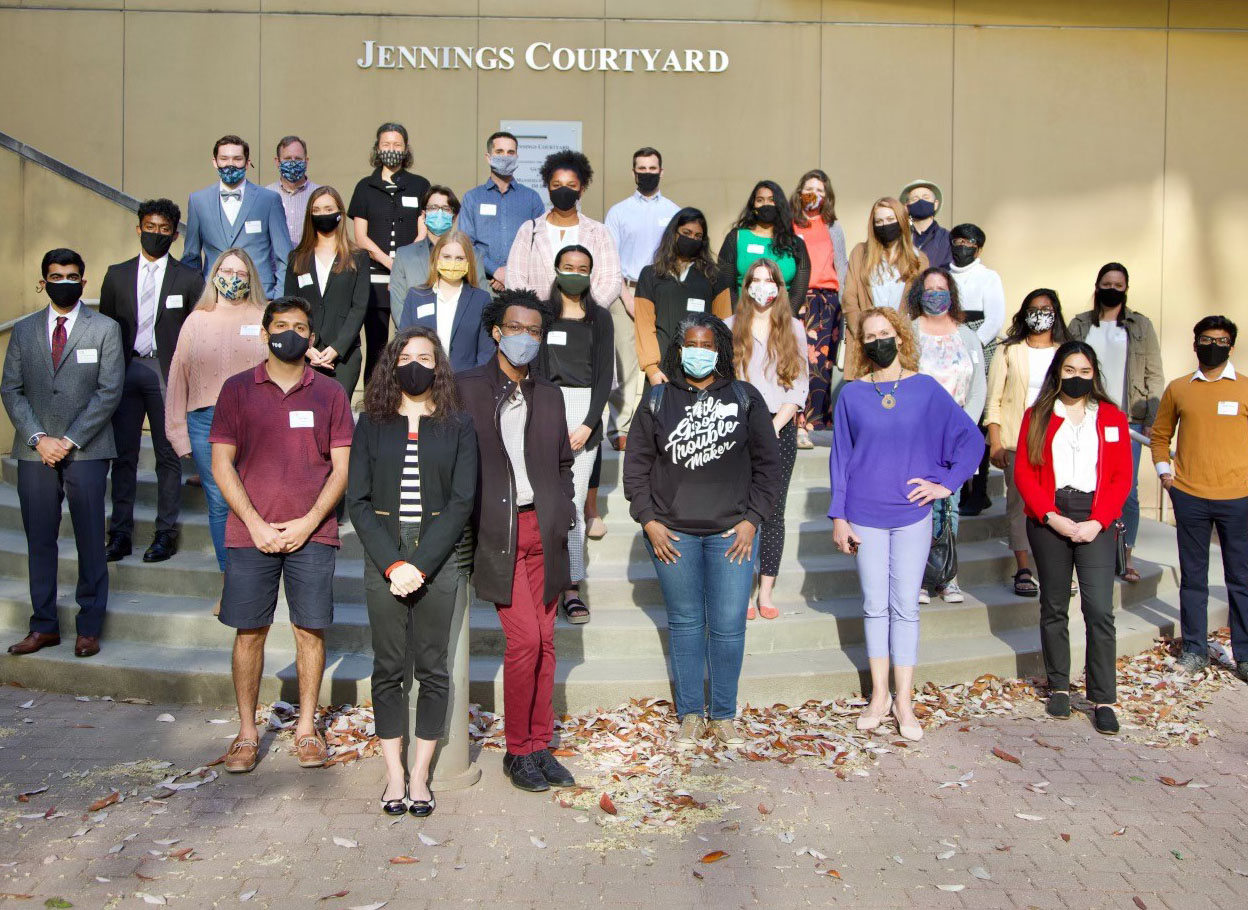For the past 12 years, the Ideas to Serve (I2S) Competition organized by the Institute for Leadership and Social Impact (ILSI) at the Georgia Tech Scheller College of Business inspires students and recent alumni to think creatively about how to create a better world. Participants explore the root causes of systemic conditions around, and gaps in existing solutions for a social, economic, or environmental issue, often with guidance from a community partner. Some present their problem discovery and others present a solution that addresses those solution gaps to a team of expert judges – many of them practitioners from the social sector. First, second, and third place winners receive a financial prize which they can choose to use to further investigate ways to fill impact gaps. Although the teams worked virtually for the second year in a row, their work proved that resiliency and determination to make a difference in the world has no physical boundaries.
Emphasizing Community Partnerships
This year, student teams partnered with community organizations and civic entrepreneurs to better understand the causes and systemic factors that keep social and environmental issues in place. This relationship between students and community leaders provided an opportunity for mutual learning and led students to a more in-depth understanding of complex issues as their partners shared their personal experience and provided meaningful guidance.
The 2021 competition was especially notable because most of the organizations the teams partnered with are minority and women-owned. Students engaged with these organizations for a full semester in the I2S workshop course. During the series of workshops, teams learned problem discovery tools and applied those to their projects with community partners including Carrie’s Closet, Grove Park, Life School, LISC, Ubuntu, WUNDERgrubs, and Housing Tonight. From these immersive partnerships, students and practitioners jointly identified problems they wanted to better understand, and participation in the I2S Competition was the culmination of that journey. Student teams presented their problem discovery journey, systems maps, and possible evidence-based solutions for consideration.
Competition Requirements
Due to the virtual environment, teams were required to submit a three-minute video of their discovery journey, an executive summary of their problem/solution discovery journey, and a thorough bibliography that cites the sources they consulted in their research. Students were required to choose one of two tracks: The Problem Discovery Track for those teams who are researching a social/environmental issue with the intent of gaining a deep understanding of that space and where their skills fit in, and the Solutions Discovery Track for teams who are more advanced in their discovery journey and are now exploring community-based solutions.
“Understanding the system-level gaps between the problem and the solution space – and seeing students identify sustainable paths to addressing those gaps – is one of the outcomes we hope to see at I2S. Through the various problem discovery tools we explore in our workshops, we encourage students to also identify what roles they can each play in closing those gaps,” said Dori Pap, managing director of ILSI.
Impact-Driven Submissions
This year, 12 teams advanced to the semifinals in the Problem Discovery Track and five teams advanced in the Solution Discovery Track. For the finals round, seven teams were chosen in the Problem Discovery Track and four teams were chosen in the Solutions Discovery Track.
Some examples of the collaborative projects in the Problem Discovery Track included WUNDERgrubs, founded by social entrepreneur, Akissi Stokes, which addresses food insecurity by providing sustainably farmed, edible insects. The student team is made up of Elyssa-Christina Nassar (BSBA), Sidney Winfield (AE), and Suvan Adhikari (CS), who worked with Stokes to research digital literacy initiatives and trends that WUNDERgrubs could implement to improve important aspects of farming, including increasing crop yield and expanding the customer base for farmers in their network. The student team won the Best Systems Map Award.
Team LISC (Local Initiatives Support Corporation), made up of Mohit Pinninti (CE), Deanna Berg (ME), and Hiba Hazeem (IE) worked with partner Patricia Luna to research and identify alternative lending practices that could address the fundamental inequities in the access to capital and financial services for Black-owned small businesses. This student team was the runner-up in the Problem Discovery Track.
 Summer Slide won first place in the Problem Discovery Track, and included team members Jolie Fouts (BSBA), Lyle Hoge (BSBA), Kayli Moody (INTA), and Janell Tanner (CS), under the direction of Georgia Tech professor Neha Kumar. The issue this team researched was the significant loss in learning that occurs during the summer for students in grades K-12 with a specific focus on how this affects the public school system in Atlanta. One of the interesting gaps in existing solutions the team identified is that while most knowledge loss occurs in math, summer school programs typically focus on reading remediation rather than STEAM subjects.
Summer Slide won first place in the Problem Discovery Track, and included team members Jolie Fouts (BSBA), Lyle Hoge (BSBA), Kayli Moody (INTA), and Janell Tanner (CS), under the direction of Georgia Tech professor Neha Kumar. The issue this team researched was the significant loss in learning that occurs during the summer for students in grades K-12 with a specific focus on how this affects the public school system in Atlanta. One of the interesting gaps in existing solutions the team identified is that while most knowledge loss occurs in math, summer school programs typically focus on reading remediation rather than STEAM subjects.
“After studying our community’s education system, we learned how intricate the issues of summer slide and its corresponding effects truly are. We had to consider so many variables including intellectual ability, motivation, cultural emphasis on higher learning, family income levels, and many other factors to begin to understand why this issue persists,” reflected Lyle Hoges, team members on their problem discovery journey.
Watch their video below.
The panel of judges come from a wide range of industries and non-profits interested in supporting students in their journeys.
Said Jay Cranman, CEO of Hands on Atlanta about the competition, “I love I2S because it gives students an opportunity to strengthen their leadership skills and consider their role in tackling our city’s most pressing needs. As someone who has worked in the nonprofit sector for a dozen years, I’m thrilled to see Georgia Tech’s intentional collaboration with strong community partners and civic innovators.”
The winners were announced on April 21 and the awards ceremony took place in person on the evening of April 22. See a complete list of all submissions.
Finalists
Problem Discovery Track
- Summer Slide
- WUNDERgrubs
- Hydrohomies
- Pathways to Care in Reproductive Health
- Ubuntu
- Housing Tonight
- LISC
Solutions Discovery Track
Winners
Problem Discovery Track:
-
First Place: Summer Slide
Team: Jolie Fouts (BSBA), Lyle Hoge (BSBA), Kayli Moody (INTA), and Janell Tanner (CS) -
Second Place: LISC
Team: Deanna Berg (ME), Hiba Hazeem (IE), and Mohit Pinninti (CE) -
Third Place: Pathways to Reproductive Care
Team: Jillian Brashear (BIO) and Raina Parikh (INTA & ML) -
Honorable Mention: Housing Tonight
Team: Shashank Amarnath (BSBA), Joel Boggs (ME), and Zane Latess (BME) -
Honorable Mention: HydroHomies
Team: Vinh Dong (ME), Jodi Dowis (ME), Ananya Ghose (IE), and Sanjana Rajavelu (ISYE) -
Honorable Mention: Ubuntu
Team: Kelsey Abernathy (EAS), David Morales (ME), and Juhi Nahata (BME) -
Honorable Mention: WUNDERgrubs
Team: Suvan Adhikari (CS), Elyssa-Christina Nassar (BSBA), and Sidney Winfield (AE)
Solutions Track
-
First Place: LightSafe
Team: Lauren Haggerty (ID) -
Honorable Mention: GT PAWS
Team: Sharon Rachel (PhD, HSTS), Zuna Shabbir (INTA), and Faiz Syed (INTA) -
Honorable Mention: OneSTEM
Team: Francesa Sally (MBA) -
Honorable Mention: Reflex
Team: Amelia Abernathy (BA), Reed Blanchard (ME), Nevin Gilbert (CS), Akash Harapanahalli (CE), Usman Jamal (CS), and Lauryn Wright (ME)
People’s Choice Award
-
LightSafe
Best Video Award -
LightSafe
Best System/Stakeholder Map -
WUNDERgrubs
Scheller Net Impact MBA Award -
HydroHomies
The Ideas to Serve Competition would not be possible without the support of our generous sponsors. Thank you to The Cecil B. Day Program for Business Ethics, the Center for Serve-Learn-Sustain, the Steven A. Denning Technology & Management Program, Tedd Munchak Chair in Entrepreneurship, Center for International Business Education and Research, Ray C. Anderson Center for Sustainable Business, LEAD Program, Innovation and Design Collaborative, Mosley Ventures, and Speechworks.
 Special thanks goes to all the subject-matter experts who led the various workshops on tools for problem discovery like Impact Gaps Canvas (led by Daniela Papi-Thornton), Nested Systems (led by Jay Cranman), Basic Research (led by Cynthia Kutka and Liz Holdsworth), ABCD (led by Jennifer Hirsch), Stakeholder Mapping (led by Jorge Salazar), Pre-mortem (led by Susan Davis), Purposeful Presentations (led by Joey Asher), and to all the wonderful judges from the Atlanta social sector who volunteered their time to evaluate projects and provide their feedback to the teams. See the full list of judges.
Special thanks goes to all the subject-matter experts who led the various workshops on tools for problem discovery like Impact Gaps Canvas (led by Daniela Papi-Thornton), Nested Systems (led by Jay Cranman), Basic Research (led by Cynthia Kutka and Liz Holdsworth), ABCD (led by Jennifer Hirsch), Stakeholder Mapping (led by Jorge Salazar), Pre-mortem (led by Susan Davis), Purposeful Presentations (led by Joey Asher), and to all the wonderful judges from the Atlanta social sector who volunteered their time to evaluate projects and provide their feedback to the teams. See the full list of judges.
The I2S organizing team this year was led by MBA students and ILSI fellows, Joshua Burr (MBA’21), Brittany Beisner (MBA’21),and Alex Azar (MBA’22).
Participation in the Ideas to Serve Competition fulfills the final deliverable requirement for the SLS Innovating for Social Impact Program – a collaboration between the Institute for Leadership and Social Impact and the Center for Serve-Learn-Sustain.